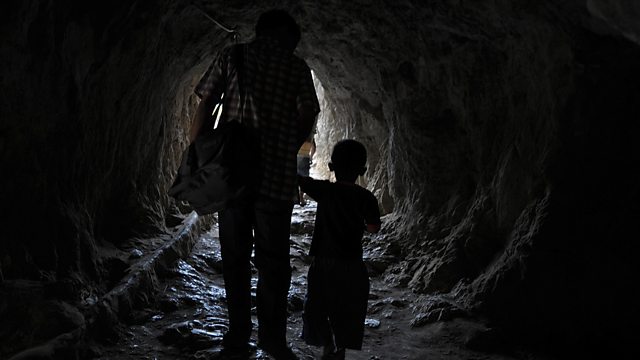Fear
How do humans and animals cope with one of the strongest emotions: fear
Heart racing, palms sweating, skin prickling are some of the things we experience when we feel frightened. So how do humans cope with one of our strongest emotions - fear? Carrie Gracie takes an unflinching examination of fear with René Hurlemann, Lucy Bolton and Liana Zanette.
Canadian biologist Liana Zanette explains breakthrough research on how intimidation changes the ecosystem. German neuroscientist René Hurlemann tells the story of very rare individuals who go through life without feeling fear. And horror film expert Lucy Bolton asks what scares us in the cinema, and why we deliberately seek to be made afraid.
Photo: A man holding a child's hand in a dark tunnel, Credit: Jay Directo/AFP/Getty Images
Last on
More episodes
Previous
Next
Clip
Chapters
-
How our brain processes fear
Duration: 12:07
What scares different people
Duration: 10:53
60 Second Idea: Filming your fear
Duration: 05:33
The Power of fear in Nature
Duration: 11:57
René Hurlemann
![René Hurlemann]() Professor René Hurlemann is a clinical psychiatrist and neuroscientist from the University of Bonn in Germany. He is one of the leaders in world-wide research on how the brain processes fear and terror. For the past��10 years, he has been studying patients with a very rare genetic disorder who feel no fear because of damage to the amygdala region of their brain. René's�� research��has uncovered vital new information on how we experience fear, which could be significant for all people with anxiety related disorders.
Professor René Hurlemann is a clinical psychiatrist and neuroscientist from the University of Bonn in Germany. He is one of the leaders in world-wide research on how the brain processes fear and terror. For the past��10 years, he has been studying patients with a very rare genetic disorder who feel no fear because of damage to the amygdala region of their brain. René's�� research��has uncovered vital new information on how we experience fear, which could be significant for all people with anxiety related disorders.��
Liana Zanette
![Liana Zanette]() Dr Liana Zanette is associate professor in the Biology Department at the University of Western Ontario, Canada. Following experiments on song birds, she argues fear itself is powerful enough to reduce the birth rate of animals who are frightened of prey, and in turn affects the way they forage for food and interact with the ecosystem. She believes predator induced fear causes animals to be constantly on guard, and means they spend less time feeding on plants and trees. This she says creates a greener landscape, but it is also a landscape shaped by fear.
Dr Liana Zanette is associate professor in the Biology Department at the University of Western Ontario, Canada. Following experiments on song birds, she argues fear itself is powerful enough to reduce the birth rate of animals who are frightened of prey, and in turn affects the way they forage for food and interact with the ecosystem. She believes predator induced fear causes animals to be constantly on guard, and means they spend less time feeding on plants and trees. This she says creates a greener landscape, but it is also a landscape shaped by fear.Lucy Bolton
![Lucy Bolton]()
Dr Lucy Bolton is a lecturer in film studies at Queen Mary, University of London. Her main areas of research are film philosophy and feminist theory. She is the author of Film and Female Consciousness. She is also fascinated by the physical power of horror films, particularly the Japanese horror film Ringu, which typically for Japanese horror, focuses on the paranormal, with a little girl ghost as protagonist. Lucy will be using this example to explore the significance of the female role in horror, and to show how this film genre exposes our vulnerabilities by subverting normal life.
Sixty Second Idea to Improve the World
Horror film expert Dr Lucy Bolton suggests conquering fear with a digital camera, so that people who suffer from fear and anxiety film what terrifies them. Then, sufferers would need to turn the film into a comedy, an animation or even an art house film. The idea is that transforming the object of their fear would diffuse and conquer it.��In Next Week’s Programme:
Job satisfaction and its importance to a country’s economy and the happiness of individual citizens, with guests including the Nobel Prize winner Edmund Phelps.Broadcasts
- Sat 19 Oct 2013 23:06GMT�鶹������ҳ��� World Service Online
- Sun 20 Oct 2013 10:06GMT�鶹������ҳ��� World Service Online
- Mon 21 Oct 2013 02:06GMT�鶹������ҳ��� World Service Online
Do you use US dollars even though they are not your country’s official currency?
Podcast
-
![]()
The Forum
The programme that explains the present by exploring the past







